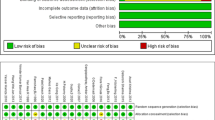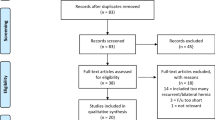Abstract
Background
Although a large number of surgeons currently perform endoscopic hernia surgery using a total extraperitoneal (TEP) approach, reviews published to date are based mainly on trials that compare laparoscopic transabdominal preperitoneal (TAPP) repair with various types of open inguinal hernia repair.
Methods
A qualitative analysis of randomized trials comparing TEP with open mesh or sutured repair.
Results
In this review, 4,231 patients were included in 23 trials. In 10 of 15 trials, TEP repair was associated with longer surgery time than open repair. A shorter postoperative hospital stay after TEP repair than after open repair was reported in 6 of 11 trials. In 8 of 9 trials, the time until return to work was significantly shorter after TEP repair. Hospital costs were significantly higher for TEP than for open repair in all four trials that included an economic evaluation. Most trials (n = 14) reported no differences in subsequent recurrence rates between TEP and open repair.
Conclusions
The findings showed that endoscopic TEP repair is associated with longer surgery time, shorter postoperative hospital stay, earlier return to work, and recurrence rates similar to those for open inguinal hernia repair. The procedure involves greater expenses for hospitals, but appears to be cost effective from a societal perspective. The TEP technique is a serious option for mesh repair of primary hernias.
Similar content being viewed by others
References
Rutkow IM, Robbins AW (1993) Demographic, classificatory, and socioeconomic aspects of hernia repair in the United States. Surg Clin North Am 73: 413–426
Lichtenstein IL, Shulman AG, Amid PK, Montllor MM (1989) The tension-free hernioplasty. Am J Surg 157: 188–193
Welsh DRJ, Alexander MAJ (1993) The Shouldice repair. Surg Clin North Am 73: 451–469
Stoppa RE, Warlaumount CK (1995) The preperitoneal approach and prosthetic repair of groin hernias. In: Nyhus LM, Coldon RE (eds) Hernia. 4th ed. JB Lippincott, Philadelphia pp 118–210
EU Hernia Trialists Collaboration (2000) Mesh compared with nonmesh methods of open groin hernia repair: systematic review of randomized controlled trials. Br J Surg 87: 854–859
Scott NW, McCormack K, Graham P, Go PM, Ross SJ, Grant AM (2002) Open mesh versus nonmesh for repair of femoral and inguinal hernia. Cochrane Database Syst Rev 4 CD002197
Memon MA, Cooper NJ, Memon B, Memon MI, Abrams KR (2003) Metaanalysis of randomized clinical trials comparing open and laparoscopic inguinal hernia repair. Br J Surg 90: 1479–1492
Edwards CC 2nd, Bailey RW (2000) Laparoscopic hernia repair: the learning curve. Surg Laparosc Endosc Percutan Tech 10: 149–153
Medical Research Council Laparoscopic Groin Hernia Trial Group (2001) Cost-utility analysis of open versus laparoscopic groin hernia repair: results from a multicentre randomized clinical trial. Br J Surg 88: 653–661
Tsang S, Normad R, Karlin R (1994) Small bowel obstruction: a morbid complication after laparoscopic herniorraphy. Am Surg 60: 332–334
Darzi A, Paraskeva PA, Quereshi A, Menzies-Gow N, Guillou PJ, Monson JR (1994) Laparoscopic herniorraphy: initial experience in 126 patients. J Laparoendosc Surg 4: 179–183
Phillips EH, Arregui M, Carroll BJ, Corbitt J, Crafton WB, Fallas MJ, Filipi C, Fitzgibbons RJ, Franklin MJ, McKernan B, et al (1995) Incidence of complications following laparoscopic hernioplasty. Surg Endosc 9: 16–21
Kald A, Anderberg B, Smedh K, Karlsson M (1997) Transperitoneal or totally extraperitoneal approach in laparoscopic hernia repair: results of 491 consecutive herniorrhapies. Surg Laparosc Endosc 7: 86–89
Neumayer L, Giobbie-Hurder A, Jonasson O, Fitzgibbons R Jr, Dunlop D, Gibbs J, Reda D, Henderson W (2004) Open mesh versus laparoscopic mesh repair of inguinal hernia. N Engl J Med 350: 1819–1827
Bittner R, Sauerland S, Schmedt CG (2005) Comparison of endoscopic techniques vs Shouldice and other open nonmesh techniques for inguinal hernia repair: a metaanalysis of randomized controlled trials. Surg Endosc 19: 605–615
Heikkinen TJ, Haukipuro K, Koivukangas P, Hulkko A (1998) A prospective randomized outcome and cost comparison of totally extraperitoneal endoscopic hernioplasty versus lichtenstein hernia operation among employed patients. Surg Laparosc Endosc 8: 338–344
Andersson B, Hallén M, Leveau P, Bergenfelz A, Westerdahl J (2003) Laparoscopic extraperitoneal inguinal hernia repair versus open mesh repair: a prospective randomized controlled trial. Surgery 133: 464–472
Merello J, Guerra GA, Madriz J, Guerra GG (1997) Laparoscopic TEP versus open Lichtenstein hernia repair: randomized trial. Surg Endosc 11: 545
Bilgin B, Özmen MM, Zülfikaroglu B, Cete M, Hengirmen S (1997) Totally extraperitoneal (TEP) hernia repair preperitoneal open repair (PPOR). Surg Endosc 11: 542
Lal P, Kajla RK, Chander J, Saha R, Ramteke VK (2003) Randomized controlled study of laparoscopic total extraperitoneal vs open Lichtenstein inguinal hernia repair. Surg Endosc 17: 850–856
Payne J, Izawa M, Glen P (1996) Laparoscopic or tension-free inguinal hernia repair? A cost benefit analysis of 200 prospective randomized patients. SAGES, Philadelphia
Colak T, Akca T, Kanik A, Aydin S (2003) Randomized clinical trial comparing laparoscopic totally extraperitoneal approach with open mesh repair in inguinal hernia. Surg Laparosc Endosc Percutan Tech 13: 191–195
Bostanci BE, Tetik C, Özer S, Özden A (1998) Posterior approaches in groin hernia repair: open or closed. Acta Chir Belg 98: 241–244
Champault G, Rizk N, Catheline JM, Riskalla H, Boutelier P (1996) Hernies de l’aine: traitment laparoscopique pré-péritoneal versus opération de Stoppa. Etude randomisée: 100 cas. J Chir 133: 274–280
Champault GG, Rizk N, Catheline JM, Turner R, Boutelier P (1997) Inguinal hernia repair: totally preperitoneal laparoscopic approach versus stoppa operation: randomized trial of 100 cases. Surg Laparosc Endosc 7: 445–450
Suter M, Martinet O (2002) Postoperative pulmonary dysfunction after bilateral inguinal hernia repair: a prospective randomized study comparing the Stoppa procedure with laparoscopic total extraperitoneal repair (TEP). Surg Laparosc Endosc Percutan Tech 12: 420–425
Suter M, Martinet O, Spertini F (2002) Reduced acute phase response after laparoscopic total extraperitoneal bilateral hernia repair compared to open repair with the Stoppa procedure. Surg Endosc 16: 1214–1219
Khoury N (1998) A randomized prospective controlled trial of laparoscopic extraperitoneal hernia repair and mesh-plug hernioplasty: a study of 315 cases. J Laparoendosc Adv Surg Tech 8: 367–372
Bringman S, Ramel S, Heikkinen TJ, Englund T, Westman B, Anderberg B (2003) Tension-free inguinal hernia repair: TEP versus mesh-plug versus Lichtenstein. Ann Surg 237: 142–147
Wright DM, Kennedy A, Baxter JN, Fullarton GM, Fife LM, Sunderland GT, O’Dwyer PJ (1996) Early outcome after open versus extraperitoneal endoscopic tension-free hernioplasty: a randomized clinical trial. Surgery 119: 552–557
Wright DM, Hall MG, Paterson CR, O’Dwyer PJ (1999) A randomized comparison of driver reaction time after open and endoscopic tension-free inguinal hernia repair. Surg Endosc 13: 332–334
Simmermacher RK, Van Duyn EB, Clevers GJ, de Vries LS, van Vroonhoven TJMV (2000) Preperitoneal mesh in groin hernia surgery: a randomized trial emphasizing the surgical aspects of preperitoneal placement via a laparoscopic (TEP) or Grid-iron (Ugahary) approach. Hernia 4: 296–298
Nathanson L, Adib R (1996) Randomized trial of open and laparoscopic inguinal hernia repair. Surg Endosc 10: 192
Bessell JR, Baxter P, Riddell P, Watkin S, Maddern GJ (1996) A randomized controlled trial of laparoscopic hernia repair. Surg Endosc 10: 495–500
Decker D, Lindemann C, Springer W, Low A, Hirner A, von Ruecker A (1998) Endoscopic vs conventional hernia repair from an immunologic point of view. Surg Endosc 13: 335–339
Fleming WR, Elliott TB, Jones RM, Hardy KJ (2001) Randomized clinical trial comparing totally extraperitoneal inguinal hernia repair with the Shouldice technique. Br J Surg 88: 1183–1188
Champault G, Benoit J, Lauroy J, Rizk N, Boutelier P (1994) Hernies de l’aine de l’adulte: chirurgie laparoscopique vs opération de Shouldice: étude randomisée controlée: 181 patients: résultats préliminaires. Ann Chir 48: 1003–1008
Liem MS, van der Graaf Y, van Steensel CJ, Boelhouwer RU, Clevers GJ, Meijer WS, Stassen LP, Vente JP, Weidema WF, Schrijvers AJ, van Vroonhoven TJ (1997) Comparison of conventional anterior surgery and laparoscopic surgery for inguinal hernia repair. N Engl J Med 336: 1541–1547
Liem MS, van der Graaf Y, Zwart RC, Geurts I, van Vroonhoven TJ (1997) A randomized comparison of physical performance following laparoscopic and open inguinal hernia repair. Br J Surg 84: 64–67
Liem MSL, Halsema JAM, van der Graaf Y, Schrijvers AJ, van Vroonhoven TJ (1997) Cost effectiveness of extraperitoneal laparoscopic inguinal hernia repair: a randomized comparison with conventional herniorrhaphy. Ann Surg 6: 668–676
Liem MSL, van Duyn EB, van der Graaf Y, van Vroonhoven TJ (2003) Recurrences after conventional anterior and laparoscopic inguinal hernia repair: a randomized comparison. Ann Surg 237: 136–141
Champault G, Barrat C, Catheline JM, Rizk N (1998) Hernies de l’aine. Résultats à 4 ans de deux études prospectives randomisées comparant les opérations de Shouldice et de Stoppa à l’abord laparoscopique totalement pré-péritonéal (461 patients). Ann Chir 52: 132–136
Wright D, Paterson C, Scott N, Hair A, O’Dwyer PJ (2002) Five-year follow-up of patients undergoing laparoscopic or open groin hernia repair: a randomized controlled trial. Ann Surg 235: 333–337
Vatansev C, Belviranli M, Aksoy F, Tuncer S, Sahin M, Karahan O (2002) The effects of different hernia repair methods on postoperative pain medication and CRP levels. Surg Laparosc Endosc Percutan Tech 12: 243–246
Knook MTT, Weidema WF, Stassen LPS, van Steensel CJ (1999) Endoscopic total extraperitoneal repair of primary and recurrent inguinal hernias. Surg Endosc 13: 507–511
Lau H, Patil NG, Yuen WK, Lee F (2002) Management of peritoneal tear during endoscopic extraperitoneal inguinal hernioplasty. Surg Endosc 16: 1474–1477
Collaboration EH (2000) Laparoscopic compared with open methods of groin hernia repair: systematic review of randomized controlled trials. Br J Surg 87: 860–867
Leibl BJ, Jager C, Kraft B, Kraft K, Schwarz J, Ulrich M, Bittner R (2005) Laparoscopic hernia repair: TAPP or/and TEP? Langenbecks. Arch Surg 390: 77–82
The MRC Laparoscopic Groin Hernia Trial Group (1999) Laparoscopic versus open repair of groin hernia: a randomised comparison. Lancet 354: 185–190
Author information
Authors and Affiliations
Corresponding author
Rights and permissions
About this article
Cite this article
Kuhry, E., van Veen, R.N., Langeveld, H.R. et al. Open or endoscopic total extraperitoneal inguinal hernia repair? A systematic review. Surg Endosc 21, 161–166 (2007). https://doi.org/10.1007/s00464-006-0167-4
Received:
Accepted:
Published:
Issue Date:
DOI: https://doi.org/10.1007/s00464-006-0167-4




